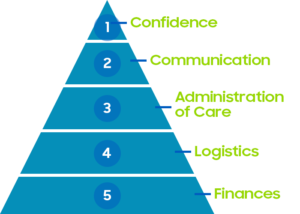
Utilizing Patient Support Programs in Healthcare
You may be familiar with Maslow’s Hierarchy of Needs. This focuses on the idea that people cannot properly thrive unless they have specific needs met. It is also possible to apply this same idea to healthcare. Here are some ways to use patient support programs to ensure your patients receive the care they need.
Tier 5: Finances
Before patients can feel comfortable receiving care, they need to know that they can actually afford the services they need.
This is a major concern for many people. In order to increase that confidence and move up the hierarchy, your facility can provide ways to work with insurance and options for patients who need financial support.
Tier 4: Logistics
The next step up the hierarchy is having patient support programs that ensure your patients have access to the knowledge they need for their care. This can include anything from understanding when their next appointment is, to being able to easily pick up their prescribed medications.
Tier 3: Administration of Care
In order to continue providing patient support programs that put their needs first, you should also consider how the patients are receiving care in your facility. Your patients should feel comfortable speaking to their providers, and providers should spend the necessary time to ensure patients’ needs are met.
This all goes back to a patient feeling secure and confident in their care. From the moment they enter your facility, patients should feel that their concerns are answered, and their needs met.

Healthcare hierarchy of needs
Tier 2: Communication
Patients need to feel that their providers are on their side. This includes a very important aspect of the patient support programs: communication.
In order to support your patients in this area, it’s important to have clear lines of communication. Understanding your patients and what information they need is crucial to their support. In addition, it should be easy for patients to ask and receive answers to their questions. Utilizing a secure messaging application, such as the one found in Notivate’s platform, allows patients to communicate in real-time and get answers to the questions they have.
Tier 1: Confidence
Finally, the top of this patient support program’s hierarchy is confidence. At this point, the patient has all of their questions answered, knows how they will receive and pay for care, and has had a good experience receiving care. All of these lead to the patient feeling confident in the care they are receiving and the next steps in treatment.
No matter what your patient is dealing with, being able to meet them on all five steps of the hierarchy ensures that they are ready to move forward and that your facility has excelled in providing a quality patient experience.
If you would like to hear more about how Notivate’s platform can help you create this superb patient experience and ensure that patients have the ability to communicate their needs with their providers, contact us for more information.


Recent Comments